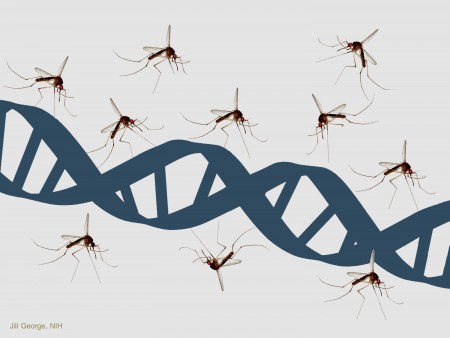February 16, 2016 – We have the means today to create an extinction event for Aedes aegypti, the mosquito currently blamed for the spread of the Zika virus, dengue fever, chikungunya, yellow fever and malaria. We can do this through the manipulation of the mosquito’s genes. Instead of spraying insecticides or removing the stagnant water sources where the mosquitoes breed, we can insert genetic information into the insect’s DNA that will disrupt its ability to reproduce. We can even construct genes that cause the natural population of the mosquitoes to only produce males, or to make females flightless. And we don’t have to do it over the entire population. We can introduce these new gene altered mosquitoes into selected areas and watch the destruction of the species begin over time. With each generation there would be fewer and fewer breeding-capable Aedes aegypti.
Doesn’t that sound like a perfect plan? But wait. Are there unintended consequences to the larger ecosystem in which these insects thrive? In targeting one mosquito will we selectively create advantage for other species?
Killing Aedes aegypti once and for all seems to be a good thing. We would save tens of thousands of lives each year. We would stop the outbreak of what the World Health Organization recently described as a “public health emergency of international concern” blamed for an abnormal number of microcephaly births since 2014 in Brazil where a Zika outbreak is threatening this summer’s Olympic Games scheduled for Rio de Janeiro.
But Aedes aegypti may not be the only mosquito we need to target. Because once humans are infected with mosquito-borne diseases they contribute to the proliferation when other species bite them and inadvertently pick up the infective agents. So that means targeting just one species may be a fool’s errand.
In addition, mosquitoes are part of the food chain for a wide variety of creatures, from fish and dragonfly nymphs that eat the larvae, to adult dragonflies and other insect predators, birds, frogs, and other animals. Apparently one reason Aedes aegypti is so pervasive is its ability to breed in standing stagnant water rather than the places where predators live – old tires, storage containers left outside, buckets, cans and bottles.
Eliminate Aedes aegypti and watch other mosquito species occupy its many niches. That means eventually having to eliminate another mosquito species using genetic tools. It is an interesting dilemma presented here. We have the tools but can we live with the unintended consequences?
And what do intelligence agencies around the world think about eliminating an insect species using genetics as a weapon? In the latest intelligence report produced by the U.S. intelligence community for the Senate Armed Services Committee, the use of gene manipulation tools like CRISPR is deemed to be potential weapons of mass destruction (WMD). On page 9 of the report it states, “Research in genome editing conducted by countries with different regulatory or ethical standards than those of Western countries probably increases the risk of the creation of potentially harmful biological agents or products. Given the broad distribution, low cost, and accelerated pace of development of this dual-use technology, its deliberate or unintentional misuse might lead to far-reaching economic and national security implications.”
Talk about unintended consequences from a disruptive technology.
Related articles across the web


















